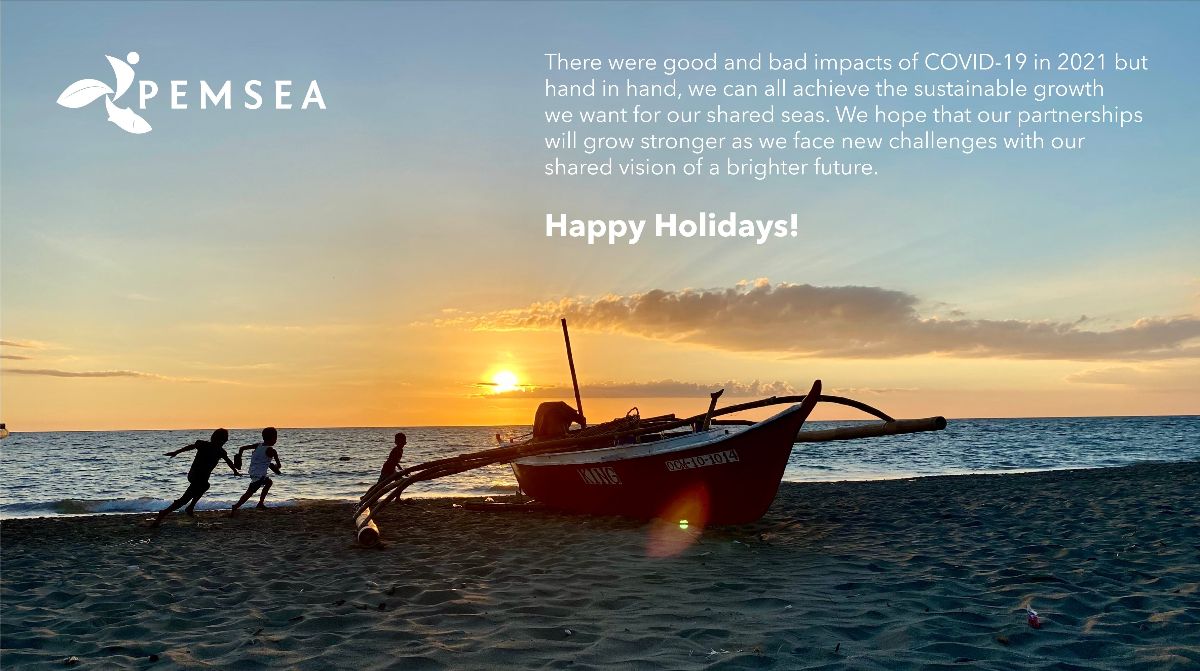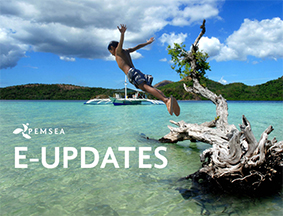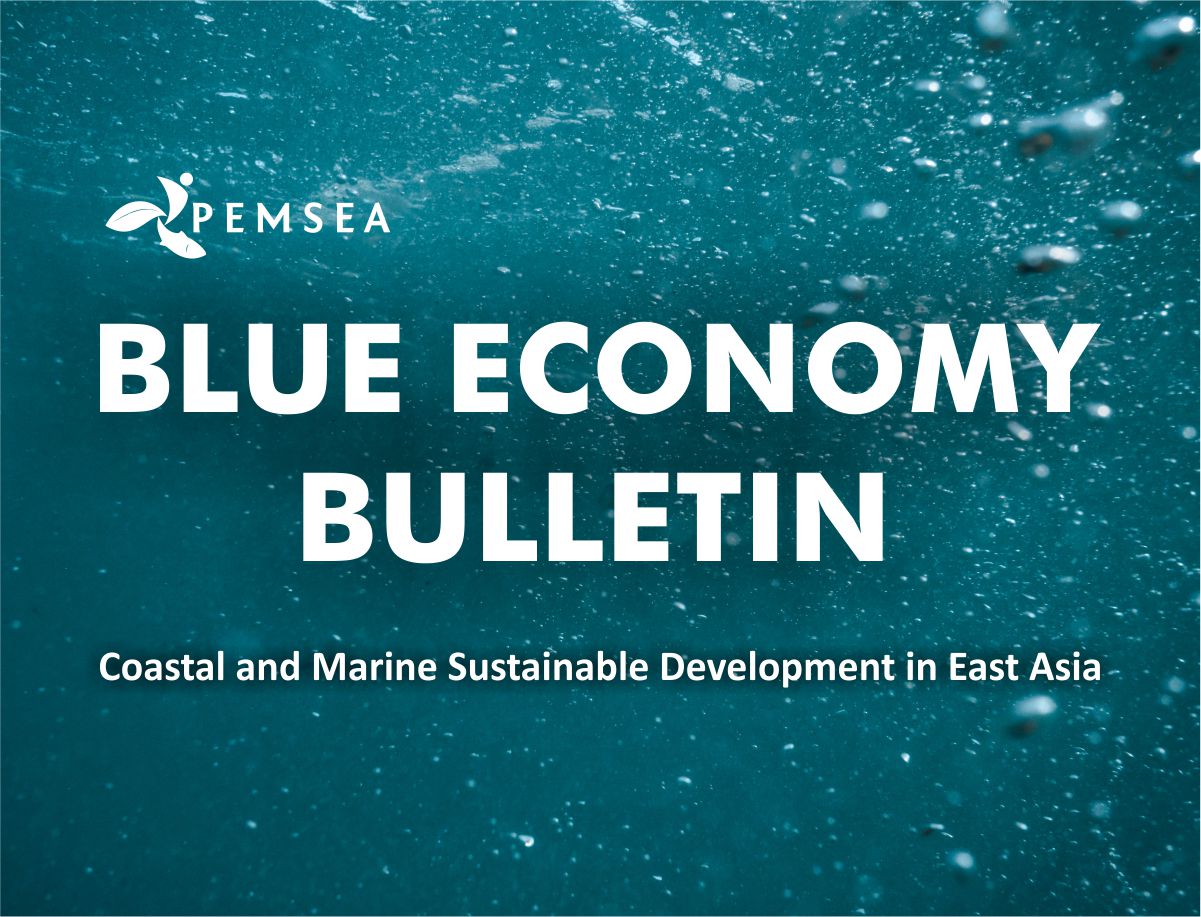
Breadcrumb
The State Of Oceans And Coasts In East Asia
Here's to a restful holidays and a better 2022!
It has been a year of challenges, and many challenges are yet still to come. Throughout this, PEMSEA and its partners have managed to continue their work towards a sustainable future for our shared seas. Such work is documented in previous newsletters.We would like to take this time to look forward. As such, we are pleased to release our Regional State of Ocean and Coasts 2021 (RSOC) report, which provides a detailed look into the environmental, economic, and demographic status of the seas of East Asia as well as actions and recommendations to accelerate the implementation of a sustainable, inclusive and resilient blue economy of the countries in the region.
It is critical to fully understand the value and use of the ocean, and the interactions and different impacts they have with each other. While data availability remains lacking in some areas, models based on what we do know provide some improved understanding. This RSOC 2021 report gives updated information and progress after the release of the initial RSOC 2018 and includes a supplement report on the impacts and opportunities of the global pandemic to transform ocean management and the blue economy.
Happy reading!
E-Update November 2021
Welcome to the November 2021 PEMSEA e-update. Please join us for the main event of the East Asian Seas Congress 2021 (EASC2021)! The Main Conference and Partnership Night will take place on 1 December.
In collaboration with United Nations Development Programme (UNDP) and funded by Global Environment Facility (GEF), a new publication titled “Sea Change: The PEMSEA Story” will be launched by PEMSEA at the Partnership Night on 1 December to chronicle 28 years of collaborative ocean governance in the seas of East Asia.
As part of the last series of pre-2021 East Asian Seas Congress (EASC) collabs, several online events were held with different topics: climate change, plastic pollution and marine pollution. We encourage all the photo enthusiasts to submit applications to the EAS Futures Youth Photo Competition 2022. The deadline for submissions is on 1 March 2022. In between newsletters, follow us on Facebook, LinkedIn and Twitter (@PEMSEA) for the latest updates.
Blue Economy Bulletin October 2021
Welcome to the PEMSEA Blue Economy Bulletin for October 2021. With just one month until the main event, the line-up of activities for the EAS Congress 2021 have been unveiled. Please join us in the EAS Congress Main Conference, which will be held on 1 December 2021.
This month, PEMSEA held a number of events covering different topics: climate change adaptation, marine protected areas (MPA), integrated coastal management (ICM) and marine spatial planning (MSP). Meanwhile, several stories from IW:Learn are shared, introducing Regional Governance Mechanism (RGM) and Stakeholder Partnership Forum (SPF) workshops for the Arafura and Timor Seas (ATS) region; artisanal fishery development in Papua New Guinea; coastal governance in the South East Asia (SEA); and marine pollution hotspots in the ATS region. The winners of EAS Futures Youth Video Competition have also been announced.
Please also join us in the upcoming EAS Congress collabs in November!
The region has seen further developments on plastic pollution, with Da Nang city launching an Action Plan to mitigate its plastic waste and implement a plastic pollution monitoring system. Indonesian environmentalists created an entirely plastic-built museum in the town of Gresik in east Java in order to raise public awareness. Meanwhile, a report from WWF shares potential Asian perspectives on a global plastic pollution treaty.
Blue economy frameworks are also continuing to develop. The Indonesian and Swedish governments have signed a joint statement on blue economy cooperation, seeking to develop a Roadmap for a Blue Economy. A new ACIAR-funded project with $2.4 million funding has been developed to enable fish-based livelihood innovation in Solomon Islands and Timor-Leste.
Follow the latest updates on blue economy and coastal sustainable development throughout the seas of East Asia on Facebook, LinkedIn and Twitter (@PEMSEA). We welcome your feedback, and please let us know if there are other blue economy topics you would like to see in future newsletters and programs.
E-Update September 2021
Welcome to the September 2021 PEMSEA e-update. PEMSEA would like to share two discussion papers, one on the current status of biofouling management and issues related to invasive aquatic species (IAS) in the East Asian Seas (EAS) region, and one on the current situation and expected future pathways for maritime shipping-related greenhouse gas emissions in East Asia. This month, bilateral meetings were held with the Philippines and Viet Nam for the Blue Solutions project. Please also join us in several East Asian Seas Congress (EASC) collabs on marine protected areas management and climate change adaptation in October. In between newsletters, follow us on Facebook, LinkedIn and Twitter (@PEMSEA) for the latest updates.
Blue Economy Bulletin August 2021
Welcome to the PEMSEA Blue Economy Bulletin for August 2021. Preparations for the 7th East Asian Seas (EAS) Ministerial Forum have officially started. The Ministerial Forum will be held virtually on 2 December 2021 during the East Asian Seas (EAS) Congress 2021. This month, UN ESCAP, Plymouth Marine Laboratory, PEMSEA and other partners co-organized a workshop focusing on innovative approaches to evidence-based plastic pollution prevention.
One of the PEMSEA’s interns shared her thoughts on International Youth Day, highlighting the role of youth in ocean sustainability for the East Asian region.
PEMSEA is delighted to share more details on the EAS Congress events on the 2021 EAS Congress website. In particular, the line-up of EAS Congress 2021 collabs taking place this September is available on the PEMSEA website. Registration is ongoing for an Online GIS Training for Marine Spatial Planning and Management until 15 September 2021.
The region continues to move against marine pollution. Funding from the Japanese government has allowed Legazpi and two other cities in the Philippines to improve their waste management systems. In Japan itself, numerous beverage vendors have switched from plastic containers to aluminium ones. Likewise, seaweed innovation has the potential to contribute to bioplastic production in Indonesia.
To help achieve sustainable fisheries, the Indonesian Ministry of Marine Affairs and Fisheries launched a national fish stock assessment to help policymakers determine and improve sustainable planning in marine capture fisheries. The seaweed and shellfish aquaculture sectors in RO Korea may provide ecosystem services related to coastal nutrient management. Meanwhile, innovation in food science development is providing new alternatives to wild fisheries.
Follow the latest updates on blue economy and coastal sustainable development throughout the seas of East Asia on Facebook, LinkedIn and Twitter (@PEMSEA). We welcome your feedback, and please let us know if there are other blue economy topics you would like to see in future newsletters and programs.
E-Update July 2021
Welcome to the July 2021 PEMSEA e-update. We encourage those eligible to join the EAS Futures Video Competition, with one month left to submit. Please also join us in an event on innovative approaches to evidence-based plastic pollution prevention, held on 5 August 2021.
Our recently concluded events include a kick-off meeting for the IMO-PEMSEA-IKI Blue Solutions Project to reduce the maritime transport emissions in Asia, as well as a live webinar focused on raising awareness of gender issues and mainstream social inclusion in the Arafura and Timor Seas (ATS) region. The significant role of PEMSEA in coordinating regional cooperation to adapt to sea level rise impacts was mentioned by Dr. Vu Thanh Ca in the United Nations Open-ended Informal Consultative Process on Oceans and the Law of the Sea meeting. In between newsletters, follow us on Facebook, LinkedIn and Twitter (@PEMSEA) for the latest updates.
Blue Economy Bulletin June 2021
Welcome to the PEMSEA Blue Economy Bulletin for June 2021. PEMSEA organized a number of online events this month, starting with an Ocean Roundtable Dialogue on World Ocean Day, with a focus on supporting collaborative actions to harness the blue economy in post-pandemic recovery plans. It was followed by a GESI conference organized by UNDP/GEF/ATSEA-2. Finally, we hosted two maritime transport related seminars with the IMO, the Regional Awareness Raising Seminar on the impact of biofouling on the marine environment in the seas of East Asia and a kickoff for an IMO/PEMSEA project supported by the International Climate Initiative (IKI) focused on tackling the global challenge of maritime transport emissions.
This month, we would also like to re-issue our call to all video enthusiasts to submit applications to the EAS Futures Video Competition. The deadline for submissions is on 1 September 2021.
A regional action plan was adopted by ASEAN member states and will be implementing over for the next five years to mitigate the plastic pollution issues. In Indonesia, a recycling centre was launched to reduce the plastic pollution by turning crisp bags and shampoo packets into paving bricks. Likewise, a Singapore recycling firm developed an application that assists in connecting the junk dealers with the company as well as members of the public who want recycling collected from outside their homes.
The Asian Development Bank (ADB) signed a green loan with wind power companies to build and operate three wind farms in Viet Nam, with an expectation of increasing the wind power capacity by 30%. Global Environment Facility (GEF) pledged to fund a Philippine government-led project to conserve Philippine Rise, while three new research projects on rising sea-level have been awarded with funding under National Sea Level Programme in Singapore.
Follow the latest updates on blue economy and coastal sustainable development in East Asia on Facebook, LinkedIn and Twitter (@PEMSEA). We welcome your feedback, and please let us know if there are other blue economy topics you would like to see in future newsletters and programs.E-Update May 2021
Welcome to the May 2021 PEMSEA e-update. In celebration of World Oceans Day, we are pleased to announce the Ocean Roundtable Dialogue (RTD) to promote blue economy during the new normal. This will take place on 8 June 2021. We hope you will be able to attend. We also look at how the SDS-SEA Project brought positive change through sustainable livelihood programs to eight Integrated Coastal Management (ICM) sites. Meanwhile, the ATSEA-2 Project has released its first Annual Project Progress Report, highlighting the work that has taken place at regional, national, and local levels. In between newsletters, follow us on Facebook, LinkedIn and Twitter (@PEMSEA) for the latest updates.
Blue Economy Bulletin April 2021
Welcome to the PEMSEA Blue Economy Bulletin for April 2021. This month, PEMSEA and partners held a virtual training workshop on claims and compensation for oil spills from ships. This training is part of PEMSEA's technical assistance to implement the Gulf of Thailand (GOT) Framework Programme and Strategic Action Plan 2017-2021. Check out information on the upcoming East Asian Seas (EAS) Congress 2021. The Congress proper, which will be held in December, will be preceded by a series of online events starting from June 2021. For more information, please visit the EAS Congress 2021 website. PEMSEA has announced the winners of the EAS Futures Youth and the Oceans Photo Competition and the deadline of the EAS Futures Youth Video Competition has been extended to 1 September 2021.
In coastal and marine news through East Asia and elsewhere, a new report found that Southeast Asian countries could potentially unlock significant value through better recycling of plastic waste. Viet Nam committed to tackling plastic pollution through its announcement as co-convenor of a Ministerial Conference on Marine Litter and Plastic Pollution. Likewise, UNEP and Google announced to fight plastic pollution together by applying citizen science and machine learning.
A webinar series on Conservation Financing emphasized the importance of sustainable management on biodiversity and discussed the potential efforts to augment revenue and diversify funding sources to finance conservation. Through puppetry and stories, an Indonesian environmentalist draws national attention to the importance of mangrove conservation. A study by the World Economic Forum suggests freshwater fish farms are potentially a more sustainable alternative to farming at sea, bolstering food security with fewer economic and resource constraints.
Follow the latest updates on blue economy and coastal sustainable development in East Asia on Facebook and Twitter (@PEMSEA). We welcome your feedback, and please let us know if there are other blue economy topics you would like to see in future newsletters and programs.


